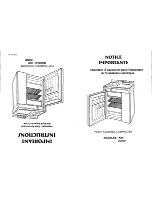
English
7
•
Depending on their type and intended use, frozen foods can be thawed correctly at room
temperature, in the refrigerator, in an electric oven (conventional or fan), or in a
microwave oven using the relevant function.
Making ice-cubes
Fill the tray provided 2/3 full of water or any other liquid you wish to freeze. Place it in the
freezer compartment, making sure that its bottom is dry so that it will not stick to the shelf of
the compartment. To detach the ice-cubes, twist the tray slightly or place it under running
water for a few seconds.
Maintenance and Cleaning
Defrosting the refrigerator compartment
The refrigerator compartment has automatic defrosting. During normal operation of the
refrigerator, frost forms on its back wall when the compressor is working and dissolves when it
is not in operation. When the compressor is not working, the frost which has built up on the
back-wall melts and the water flows into the opening provided in the bottom of the body of
the refrigerator. From here, it flows into the tray on the compressor, where it evaporates.
Warning:
the amount of ice which forms on the back wall may vary with
changes in weather conditions (temperature and humidity), the frequency
with which the door is opened, the appliance's operating temperatures and
the amount of fresh foods stored inside (especially fruit and vegetables).
Defrosting the freezer
The freezer compartment has to be defrosted manually. When the thickness of frost or ice on
the shelves exceeds 2cm, the freezer should be defrosted. A few hours before defrosting, use
the knob provided to set the thermostat on 7 in order to further lower the temperature of the
frozen foods. Then turn the knob to the 0 (stop) setting and disconnect the plug from the
electrical mains. Remove the frozen foods from the freezer compartment and protect them
from thawing while cleaning.
Cleaning the refrigerator
•
Before cleaning, disconnect the plug from the electrical mains. Clean the outside using only
water and a gentle liquid detergent or an ordinary detergent for washable surfaces (such
as a window-cleaning product). Never use products containing abrasives or substances
which may attack the lacquered or painted parts, acids or chemical solvents. Use a sponge
or a soft cloth.
•
Do not use steam cleaners to clean the inside;
•
Remove the shelves and accessories, taking care not to apply excessive force when
removing. Follow the instructions provided in the "Door racks and Containers" section
carefully. Never wash removable plastic parts in the dishwasher; use only warm water and










































